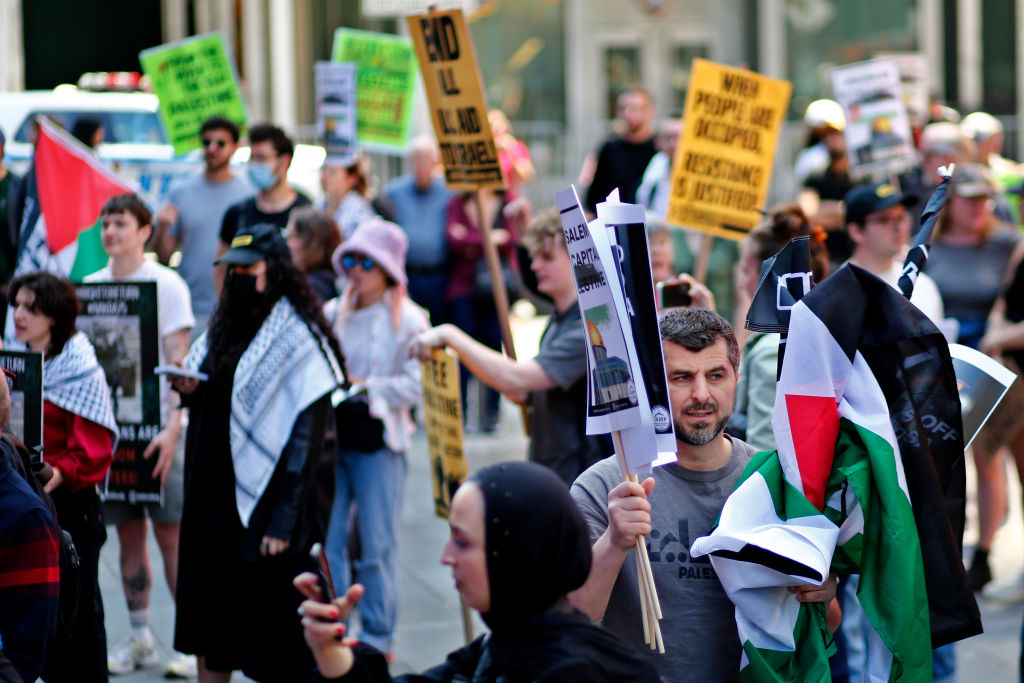
For the first time ever, the U.N. will commemorate the Nakba, or “catastrophe” in Arabic, in which at least 700,000 Palestinians fled or were forcibly expelled from their homes during the creation of Israel in 1948.
On May 15, Palestinian Authority President Mahmoud Abbas will deliver a keynote speech at the U.N. General Assembly in New York, as part of a high-level special meeting to mark Nakba Day. In a statement outlining the event, the U.N. said the occasion aims to “highlight that the noble goals of justice and peace require recognizing the reality and history of the Palestinian people’s plight and ensuring the fulfillment of their inalienable rights.”
As the 75th anniversary of the Nakba approached, the 193-member General Assembly voted in November on whether to host a commemoration event; the plan was approved by a vote of 90-30 with 47 abstentions. The U.S., a longtime military and financial supporter of Israel, voted against the event and confirmed that no American diplomats would be present.
For many others, the U.N.’s decision is an acknowledgement of the central role played by the intergovernmental organization in the partition of the Mandate for Palestine.
“It’s acknowledging the responsibility of the U.N. of not being able to resolve this catastrophe for the Palestinian people for 75 years,” said Riyad Mansour, the Palestinian U.N. ambassador, according to the Associated Press.
Israel’s U.N. ambassador, Gilad Erdan, described the commemoration as “abominable” and called it a “blatant attempt to distort history.”
Read More: Darin Sallam on Portraying the Nakba in Netflix’s ‘Farha’
From the early 1900s, a growing number of Zionist settlers escaping antisemitism in Europe arrived in the Mandate for Palestine. During the 1920s and 1930s, Palestinians resisted displacement that had been enabled by the British colonial presence. British forces eventually tasked the U.N. with finding a solution.
In 1947, the U.N. General Assembly, formed of 57 member states at the time, passed a resolution to divide the Mandate for Palestine into a Jewish state and a Palestinian one. The plan allocated more than half the country to the Jewish state at a time when Jews formed around one-third of the population. The plan would also have left around 500,000 Palestinians living in a future Jewish state with a drastic choice: remain a minority in a Jewish state or leave.
Palestinians rejected the proposal and when the British mandate expired in 1948, Israel declared its independence.
Fighting broke out and 5 Arab countries—Egypt, Jordan, Lebanon, Iraq, and Syria—deployed forces to stem the flow of Palestinian refugees. The aftermath of the fighting saw Israel conquer additional land that the U.N. plan had earmarked for a Palestinian state, while Egypt and Jordan each retained control over the Gaza Strip and the West Bank, respectively.
Over time, the Israel took control of more land that was formerly designated by the U.N. as part of a future Palestinian state. After the June 1967 War between Israel and a coalition of Arab states, Israel occupied the Gaza Strip and the West Bank.
In recent decades, Israeli settlements in the West Bank have expanded under successive governments, with the settler population surpassing half a million people earlier this year. The settlements are considered illegal under international law, and much of the international community see them as an obstacle to peace and a future Palestinian state.
This year, Nakba Day is being observed on the heels of a round of violence between Israel and Palestinian militant groups. Israeli airstrikes which intended to target key figures from Islamic Jihad, the second-largest Palestinian armed group in Gaza, claimed at least 33 Palestinian lives. Meanwhile, Palestinian militant groups fired as many as 800 rockets toward Israel, leading to the death of two people in Israel.
“The catastrophe to the Palestinian people is still ongoing,” Mansour said, adding that Palestinians are still being “forcibly removed” from their homes.
More Must-Reads From TIME
- The 100 Most Influential People of 2024
- The Revolution of Yulia Navalnaya
- 6 Compliments That Land Every Time
- What's the Deal With the Bitcoin Halving?
- If You're Dating Right Now , You're Brave: Column
- The AI That Could Heal a Divided Internet
- Fallout Is a Brilliant Model for the Future of Video Game Adaptations
- Want Weekly Recs on What to Watch, Read, and More? Sign Up for Worth Your Time
Write to Armani Syed at armani.syed@time.com